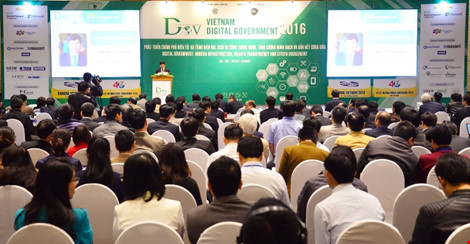
According to FPT Information System’s general director Pham Minh Tuan, based on FPT’s practical experience in developing so-called smart cities, through the Internet of Things (IoT), the drawbacks in any given IT projects come down to the budget, executive determination, implementation methods, communications management, and human resources.
The implementation method, in particular, is arresting the country’s IT development at present, said Tuan.
“IT contractors around the world generally praise Vietnamese people for being clever. And yet because we are clever, we often come up with unusual ideas or requests, which can be complicated or rather different from the rest of the world, to actually put into practice,” said Tuan, during an interview following the conference on the Vietnam Digital Government 2016, organised by the Hanoi Department of Information and Communications and IDG Vietnam last week.
“It could therefore take twice as long to implement an IT project in Vietnam than in other countries,” he stressed, citing that while it took FPT a total of eight years to implement a budget management system for the nation, it only took 16 months to put the exact same system into practice in Cambodia. “Also, it merely took a year for us to execute a tax system for Bangladesh.”
Tuan said that these countries were willing to follow the world’s best practice, and they made no attempts to innovate, which cut short the implementation process.
In addition, Vietnam is also acting as a perfectionist, in a sense that it always desires to perfectly downsize each IT project, which in turn leaves the country struggling to come up with ideal solutions. “What is actually needed the most is really putting each project into practice,” Tuan said.
By developing digital government (eGov), for instance, enables the government to improve its management, administration, and services through the effective application of information technology. While IT applications can obviously do their job and meet perhaps 50-60 per cent of the government’s requirements at first, local authorities, on the other hand, expect the new system to work seamlessly at once.
“And because the system cannot meet their full anticipation in one go, they will not even try to apply the technology,” he shared. “For any technology employed around the world, it normally takes four or five years to see tangible results or fine-tune it to fully meet the desired expectations. Vietnam should not rush the end results.”
The development trail of IT applications in Vietnam’s e-government has in fact faced numerous challenges from an undeveloped IT infrastructure and implementation methods. In 2015, Vietnam was ranked as the 102nd in the ICT Development Index of International Telecommunications Union, falling behind its 94th spot attained in 2014.
IT applications in the operation of local government organisations is urgent in the sense that Vietnam has started to integrate deeply into the global economy. The country, as such, must put up its eGov as quickly as possible.

 Previous page
Previous page Back to top
Back to top







